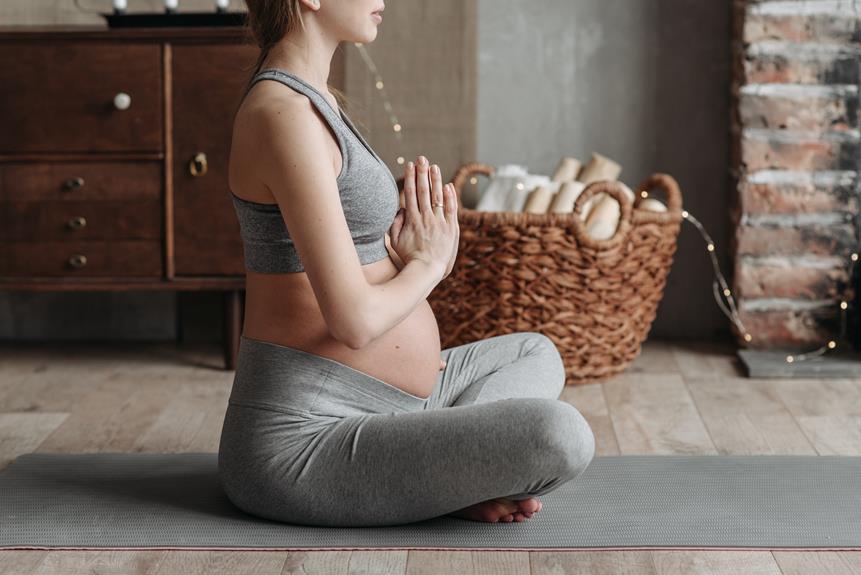Meditation Help Manage Anxiety During Pregnancy

In the midst of the beautiful journey of pregnancy, anxiety can often cast a shadow on the joyous anticipation. However, there is a powerful tool that can help expecting mothers find peace and serenity amidst the storm of anxiety – meditation.
By cultivating mindfulness and incorporating simple yet effective techniques, meditation can be a guiding light for managing anxiety during pregnancy.
In this article, we will explore the profound benefits of meditation and provide practical insights on creating a meditation routine tailored to this transformative time.
Key Takeaways
- Pregnancy can contribute to increased stress and anxiety levels, making it crucial to find ways to manage and cope with pregnancy anxiety.
- Meditation has been shown to have numerous positive effects on mental well-being, including reducing stress, improving focus, and increasing self-awareness.
- Mindfulness techniques, such as breathing exercises and mindfulness exercises, can be helpful in managing pregnancy anxiety by promoting self-awareness and reducing anxiety symptoms.
- Visualization techniques, when combined with relaxation techniques, can help manage anxiety and stress during pregnancy by focusing the mind on positive outcomes and envisioning a healthy pregnancy.
The Link Between Pregnancy and Anxiety
There is a growing body of research suggesting a potential link between pregnancy and anxiety. Pregnancy is a transformative and exciting experience, but it can also bring about significant stress and anxiety for expectant mothers. The hormonal and physiological changes that occur during pregnancy can contribute to increased levels of stress and anxiety.
Additionally, concerns about the health and well-being of both the mother and the baby, as well as the anticipation of the challenges of motherhood, can further exacerbate these feelings. Coping with pregnancy anxiety is crucial for the well-being of both the mother and the baby.
Finding effective strategies to manage stress and anxiety during pregnancy, such as meditation, can help reduce the negative impact on the mother's mental health and promote a healthier pregnancy. By incorporating meditation techniques into their routine, expectant mothers can cultivate a sense of calm and relaxation, improving their overall well-being and promoting a positive pregnancy experience.
Understanding the Benefits of Meditation
Numerous studies have demonstrated the positive effects of meditation, and incorporating regular meditation practices into one's routine can significantly improve mental well-being. Understanding the science behind meditation and finding the right meditation method are key to maximizing its benefits.
| Method | Description | Benefits |
|---|---|---|
| Mindfulness | Focusing on the present moment and accepting it without judgment. | Reduces stress, improves focus, and increases self-awareness. |
| Loving-Kindness | Cultivating feelings of love and compassion towards oneself and others. | Enhances empathy, reduces negative emotions, and promotes positive relationships. |
| Transcendental | Repeating a mantra silently to achieve a state of deep relaxation and heightened awareness. | Reduces anxiety, improves sleep, and enhances overall well-being. |
Mindfulness Techniques for Managing Pregnancy Anxiety
Managing anxiety during pregnancy is crucial for the well-being of both the mother and the baby.
Mindfulness techniques, such as breathing exercises and visualization, can be effective in reducing anxiety levels and promoting relaxation.
Breathing Exercises for Anxiety
Several studies have shown that incorporating regular breathing exercises into a mindfulness practice can significantly alleviate anxiety symptoms during pregnancy. Breathing techniques can help pregnant women relax, reduce stress levels, and promote overall well-being.
Here are three sub-lists highlighting the benefits of breathing exercises for anxiety:
- Improved oxygenation:
- Deep breathing increases oxygen levels in the body, promoting a sense of calmness and reducing anxiety.
- Proper oxygenation enhances brain function and helps regulate emotions, leading to reduced stress and anxiety.
- Relaxation response:
- Focused breathing activates the body's relaxation response, triggering a physiological state of calmness and reducing anxiety symptoms.
- Breathing exercises can help pregnant women relax their muscles, release tension, and achieve a state of tranquility.
- Mind-body connection:
- Practicing mindfulness exercises with breathing techniques promotes self-awareness and connection with the present moment, reducing anxiety and enhancing emotional well-being.
- By focusing on their breath, pregnant women can cultivate a sense of grounding and stability, allowing them to better cope with anxiety during pregnancy.
Transition: While breathing exercises are effective in managing anxiety, visualization techniques for calmness can also be beneficial during pregnancy.
Visualization Techniques for Calmness
Practicing visualization techniques enhances mindfulness and fosters a state of calmness, aiding in the management of pregnancy anxiety.
Visualization techniques involve creating mental images of peaceful and soothing scenes, allowing the mind to focus and relax.
These techniques can be particularly beneficial for pregnant women, as they provide a means of managing anxiety and stress during this transformative time.
By visualizing positive outcomes and envisioning a healthy and happy pregnancy, women can alleviate their worries and promote a sense of well-being.
Additionally, visualization techniques can be combined with other relaxation techniques, such as deep breathing and progressive muscle relaxation, to further enhance their effectiveness.
Incorporating these practices into a daily routine can help expectant mothers cultivate a sense of calmness and mindfulness, ultimately supporting their overall well-being during pregnancy.
Deep Breathing Exercises for Relaxation
The effective use of specific deep breathing exercises promotes a state of relaxation and enhances mental well-being. Incorporating relaxation techniques into our daily routine is crucial for stress reduction and maintaining a balanced lifestyle. Deep breathing exercises offer an accessible and powerful tool to achieve these goals.
Consider the following benefits of deep breathing exercises:
- Deep breathing activates the body's relaxation response, reducing stress and anxiety levels.
- It improves oxygen flow, leading to increased alertness and focus.
- Deep breathing exercises can lower blood pressure and heart rate, promoting overall cardiovascular health.
Creating a Meditation Routine During Pregnancy
An essential aspect of establishing a successful meditation routine during pregnancy is incorporating regular mindfulness practices into one's daily schedule. Creating a meditation space can greatly enhance the effectiveness of these practices.
It is important to find a quiet and comfortable area where one can relax and focus on their breath, thoughts, and emotions. This dedicated space can serve as a sanctuary for pregnant women to connect with their inner selves and find peace amidst the chaos of daily life.
Additionally, finding guided meditation resources can be highly beneficial in guiding individuals through their meditation journey. There are numerous apps, websites, and books available that offer a variety of guided meditations specifically tailored for pregnancy. These resources can provide support, inspiration, and guidance, helping pregnant women navigate the challenges and changes that come with this special time in their lives.
Overcoming Common Challenges in Meditation
Overcoming common challenges in meditation is essential for maintaining a consistent practice.
One of the main challenges is dealing with distractions during meditation, which can disrupt the focus and hinder progress.
Distractions During Meditation
Despite the prevalence of distractions, maintaining focus during meditation is essential for achieving a state of deep relaxation and mental clarity.
In order to manage distractions and increase focus, individuals can employ various strategies:
- Create a designated meditation space: Having a dedicated area for meditation can help minimize external distractions and create a peaceful environment conducive to focus.
- Set intentions before starting: Establishing clear intentions for the meditation session can help anchor the mind and provide a sense of purpose, making it easier to stay focused.
- Practice mindfulness: By cultivating a non-judgmental awareness of thoughts and distractions as they arise, individuals can learn to acknowledge and let go of them, returning their attention to the present moment.
Maintaining Consistent Practice
In order to maintain consistent practice in meditation, it is crucial to establish a regular schedule and allocate dedicated time for mindful reflection each day.
Consistency challenges and finding motivation can be common obstacles in maintaining a meditation practice. However, for those who desire to serve others, it is important to overcome these challenges in order to cultivate a sense of inner peace and clarity that can be extended to those in need.
One way to address consistency challenges is to create a daily routine that includes meditation as a non-negotiable activity. By setting aside a specific time each day, it becomes easier to prioritize and commit to the practice.
Additionally, finding motivation can be facilitated by reminding oneself of the positive impact meditation has on mental and emotional well-being, which ultimately enables one to better serve and support others.
Sharing Your Meditation Journey With Others
The article explores the benefits of sharing your meditation journey with others, highlighting the positive impact it can have on one's personal growth and mindfulness practice. When we share our experiences, we not only find support but also create a sense of community that enhances our journey towards inner peace and self-discovery.
Here are three reasons why sharing your meditation journey with others can be beneficial:
- Validation and Understanding: Sharing our experiences allows us to connect with others who may have similar struggles or challenges. It provides us with a sense of validation and understanding, knowing that we are not alone in our journey.
- New Perspectives and Insights: By sharing our meditation journey, we open ourselves up to receiving new perspectives and insights from others. Different individuals bring their unique experiences and wisdom, which can enrich our own practice and help us grow.
- Accountability and Motivation: Sharing our meditation journey with others creates a sense of accountability and motivation. When we engage in discussions or group practices, we feel encouraged to stay committed and consistent with our practice, knowing that we have a support system that we can rely on.
Frequently Asked Questions
How Does Pregnancy Affect Anxiety Levels in Women?
Pregnancy can have varying effects on anxiety levels in women. Factors such as hormonal fluctuations and physical changes can contribute to increased anxiety. Engaging in regular exercise has been shown to help reduce anxiety in pregnant women.
Can Meditation Be Harmful During Pregnancy?
While meditation has been shown to have numerous benefits for managing anxiety, it is important to consider potential risks during pregnancy. Exploring safe and effective meditation techniques specifically designed for pregnant women is essential.
What Are Some Alternative Techniques for Managing Pregnancy Anxiety Besides Meditation?
Breathing exercises and mindfulness techniques are alternative techniques for managing pregnancy anxiety. These practices can help individuals focus on the present moment and regulate their breathing, promoting relaxation and reducing stress levels.
How Long Does It Take to See the Benefits of Meditation in Managing Pregnancy Anxiety?
The benefits of meditation in managing pregnancy anxiety can be experienced with regular practice. The time required for these benefits to manifest may vary for each individual, but consistent practice is key.
Is It Normal to Experience Resistance or Difficulty When Starting a Meditation Routine During Pregnancy?
It is not uncommon to encounter resistance or difficulties when initiating a meditation routine during pregnancy. The mind may resist stillness and focus, but with patience and perseverance, these challenges can be overcome for the benefit of managing anxiety.









